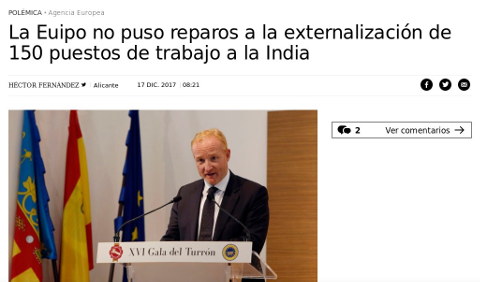

THE European Patent Office's (EPO) promotion of software patents in Europe is a daily routine; we cannot even emphasise strongly enough that it got a lot worse under António Campinos (compared to Battistelli, under whom it hadn't been done as much). As one EPO blog has just put it: "President Campinos seeks to increase its power even beyond what "sun-king" President Battistelli had." (we will say more about this separately, in our next post and later we'll focus on software patents in Europe as well).
[PDF] shows Bernd Loescher (Union Syndicale Fédérale) speaking about the rulings from the Administrative Tribunal of the International Labour Organisation*. Here it is as HTML:
Brussels
26 November 2018
To: Mr. Campinos
Mr. President,
The Union Syndicale Fédérale is perfectly aware of the serious difficulties created at the EPO in numerous spheres of activity by your predecessor. Matters relating to union members at the EPO have been widely presented in the media over the past six years. The recent rulings by the Tribunal of the International Labour Organization (proceedings of the 126th session) as well as the proceedings before the national German courts, provide details which are now widely accessible to the public at large.
Some union members have been acquitted, while others are still awaiting the results of internal procedures or proceedings brought before the Tribunal. The lengthy nature of these proceedings necessarily raises the issue of the individual suffering caused to these union members and the effectiveness of the system of appeals at the EPO. The USF takes the view that sufficient details of the matters still unresolved at the EPO are known, and these are sufficient to conclude that these conflicts are essentially political in nature, and not of a disciplinary nature.
We therefore propose, both in the interests of the new President of the EPO as well as of the blameless parties concerned, and in the general interest of social dialogue at the EPO, that an amnesty should be envisaged rapidly by the President of the EPO for the whole of the matters of a political nature. With our respectful regards
Dr. Bernd Loescher USF President
CC: Mr. Michels
Comments
Anton_P
2018-11-30 10:40:52